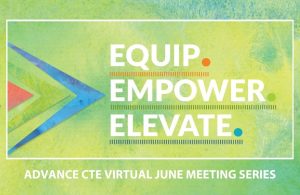 On June 8, Advance CTE held the first of three events that encompass our Virtual June Meeting Series. The series offers three opportunities to equip Career Technical Education (CTE) leaders with the latest research and innovations, empower them to succeed, and elevate their work to raise awareness of the value of CTE.
On June 8, Advance CTE held the first of three events that encompass our Virtual June Meeting Series. The series offers three opportunities to equip Career Technical Education (CTE) leaders with the latest research and innovations, empower them to succeed, and elevate their work to raise awareness of the value of CTE.
The first week ‘s sessions centered around the theme EQUIP: Building Our Capacity to Lead With A Focus On Quality and Equity. Attendees heard from inspiring keynote speaker Drexell Owusu, Chief Impact Officer for the Dallas Foundation, followed by content-rich breakouts and discussions to build connections and knowledge. Each breakout session was aligned to one of the five foundational commitments of CTE Without Limits: A Shared Vision for the Future of Career Technical Education.
Keep reading for top moments and quotes from the day!
Keynote: Pursuing Next-Level Collaboration to Jumpstart Systems Change
“(We are in) a game of influence. I can’t tell an employer what to do … and I can’t tell my school district, or city, or county what to do. This is all about making the case for change through data management and influence through relationships.” – Drexell Owusu
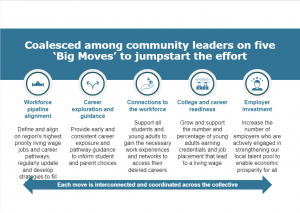 Dallas Foundation Chief Impact Officer Drexell Owusu was candid about the equity and quality of life challenges facing residents of Dallas. However, he was equally optimistic about the role that CTE can have in providing high-quality pathways to maximize recent economic growth and increase the number of young adults achieving a living wage to 50 percent within one generation. He identified five strategies that comprise the Dallas Thrives initiative to achieve this goal.
Dallas Foundation Chief Impact Officer Drexell Owusu was candid about the equity and quality of life challenges facing residents of Dallas. However, he was equally optimistic about the role that CTE can have in providing high-quality pathways to maximize recent economic growth and increase the number of young adults achieving a living wage to 50 percent within one generation. He identified five strategies that comprise the Dallas Thrives initiative to achieve this goal.
Taking Dallas’ learnings and applying them to a state audience, Owusu shared that state CTE leaders are crucial in using existing convening levers to connect systems and share information; bringing and keeping employers and staff beyond the CEO at the table; providing capacity to analyze and share data; and “democratizing” information about CTE programs.
Data Breakout: Developing Data Policies and Procedures to Monitor, Evaluate and Improve Postsecondary CTE Programs
“So much data use is focused on compliance and descriptive analysis. That’s not all that actionable. We can do so much more to deepen analysis if we make the time and space.” – Miriam Greenberg
Miriam Greenberg, Director of the Strategic Data Project at the Harvard University Center for Education Policy Research, shared their Strategic Data Project CTE Diagnostic Tool as a means to evaluate current data components and how that data is being used. Montana State CTE Director Jacque Treaster shared how their state team leveraged Advance CTE’s Opportunity Gap Analysis Workshop to transform their professional development, cross-team collaboration and staff structure to create a data-informed culture.
Equity Breakout: Equity in Education: Building Inclusive, Equitable, and Responsive CTE Programs
“In the 1980s, we heard a lot about diversity. We still have a challenge there. But we realized it’s not simply getting folks around the table or in the classroom. It’s also ensuring that those who are there are fully engaged, are welcomed and have the opportunity to use all their skills and talents.” – Dr. Kumea Shorter-Gooden
Advance CTE’s Equity Coach, Dr. Kumea Shorter-Gooden, led a nuanced and timely discussion on today’s challenges in conducting meaningful equity work. She guided attendees on the differences between equity and equality and emphasized the crucial triangle of diversity, equity and inclusion.
Lane Community College Director of High School School Connections and Advance CTE-ECMCF Fellow Justin Chin led an illuminating presentation on Asian American and Native Hawaiian/Pacific Islander (AANHPI) learners and their unique assets and barriers to achieving college and career success. In particular, he focused on how the ‘Model Minority Myth’ and the concept of social capital impact this this population’s perception of CTE, and provided culturally responsive strategies to help these learners see themselves in CTE.
Public-Private Partnerships Breakout: Cultivating Public-Private Partnerships to Maximize Learner Access, Social Capital and Opportunity
“We quickly realized that we need to bring people to help speak to students in a way they understand and connect with. That’s part of the shifting that industry and adapting that we had to do to make. We had to personalize the experience for the students.” – Gabe Madison
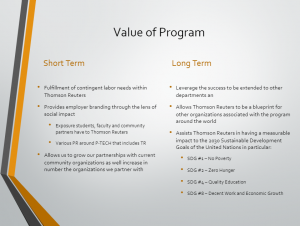 Thomson Reuters Director of Community Relations Gabe Madison shared an industry perspective on strategies that states can pursue to help employers personalize their interactions with learners and maximize feedback loops, such as convening industry leaders organized by sectors to gather feedback on program design. She also broke down Thomson Reuter’s partnership Dallas Independent School District (ISD) P-Tech program and their focus on helping learners explore careers and build social capital.
Thomson Reuters Director of Community Relations Gabe Madison shared an industry perspective on strategies that states can pursue to help employers personalize their interactions with learners and maximize feedback loops, such as convening industry leaders organized by sectors to gather feedback on program design. She also broke down Thomson Reuter’s partnership Dallas Independent School District (ISD) P-Tech program and their focus on helping learners explore careers and build social capital.
Quality Breakout: Designing Learner-Centered Career Navigation and Support Structures for Marginalized Learners
“[Our institution] is driven by five lenses: student focus, success focus, future focus, work focus and community focus.” – Deanna Strauss Hersko
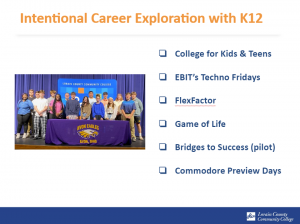 Lorain County Community College Manager of Career Technical Pathways & Programs Deanna Strauss Hersko framed improving CTE program quality as a focus on five lenses and tailoring supports to meet both learners and staff where they are. She provided a rich breakdown of institution-level supports, such as the Careers by Design badge to support each learner in exploring careers, reducing barriers to participating in CTE programs and informing learners on education options.
Lorain County Community College Manager of Career Technical Pathways & Programs Deanna Strauss Hersko framed improving CTE program quality as a focus on five lenses and tailoring supports to meet both learners and staff where they are. She provided a rich breakdown of institution-level supports, such as the Careers by Design badge to support each learner in exploring careers, reducing barriers to participating in CTE programs and informing learners on education options.
Ohio Department of Education Program Administrator Catherine Allen shared the state’s innovative approaches to building cohesive and responsive career preparation ecosystems that engage all stakeholders. This includes a tax incentive pilot for employers to expand work-based learning experiences and a program quality focus group that is exploring innovative CTE delivery models.
Systems Alignment Breakout: Systems Alignment that Benefits Learners Through Collaboration and Coordination of Federal Policy
“We recognize this work cannot happen overnight but will require a shared commitment and shared ownership among our leaders ….across education, workforce development, industry and philanthropy. Only together – through persistence, resilience, bravery, boldness, and commitment – can we realize the possibility and aspiration of a new career preparation ecosystem that provides each learner with limitless opportunities.” – CTE Without Limits
Systems alignment is a seemingly elusive yet long-sought after goal among federal education and workforce programs. New America Senior Policy Advisor Lul Tesfai and National Governors Association Program Director Amanda Winters shared best practices from states like Arizona, Indiana, and Pennsylvania and others that have leveraged funds provided through the American Rescue Plan (ARP) to meet complex learner and worker needs through multiple systems and programs. In particular, they encouraged centering decisions and investments on the needs of learners and workers and including their voices in system redesign. Advance CTE has the following related resources available: Coordinating across WIOA and Perkins and State Uses of ARP Funds.
It is not too late to register for the remaining Empower and Elevate session of the June Meeting Series, scheduled for June 15 and June 22 from 2 to 5 p.m. ET, respectively. Visit the June Meeting Series event webpage to view the full agenda and to register.
Stacy Whitehouse, Senior Associate Communications and State Engagement


 This week, Advance CTE released its third shared-vision,
This week, Advance CTE released its third shared-vision, 
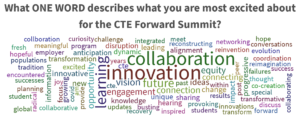 The CTE Forward Summit built on Advance CTE’s previous national Summits – held every five years – and will lead to the development of a shared vision for CTE. This vision, which must be both daring and measurable, will serve as the “true north” for the CTE community and its key partners in the coming years as we work to raise the quality of CTE pathways, ensure each learner has access to and the supports needed to be successful in those pathways and provide economic opportunity for everyone.
The CTE Forward Summit built on Advance CTE’s previous national Summits – held every five years – and will lead to the development of a shared vision for CTE. This vision, which must be both daring and measurable, will serve as the “true north” for the CTE community and its key partners in the coming years as we work to raise the quality of CTE pathways, ensure each learner has access to and the supports needed to be successful in those pathways and provide economic opportunity for everyone. Building on interest from our members – and support from the Bill & Melinda Gates Foundation and Joyce Foundation – we decided to host another round of three Perkins V implementation meetings, joined once again by our excellent partners. Over the course of three months, we brought together about 300 leaders from across 44 states and Washington, DC, along with invited national CTE and workforce development experts from over 20 partner organizations, including National Skills Coalition, National Governors Association, ExcelinEd, Council of Chief State School Officers, New America, Education Strategy Group and others, to help states:
Building on interest from our members – and support from the Bill & Melinda Gates Foundation and Joyce Foundation – we decided to host another round of three Perkins V implementation meetings, joined once again by our excellent partners. Over the course of three months, we brought together about 300 leaders from across 44 states and Washington, DC, along with invited national CTE and workforce development experts from over 20 partner organizations, including National Skills Coalition, National Governors Association, ExcelinEd, Council of Chief State School Officers, New America, Education Strategy Group and others, to help states: At each meeting, states had the chance to present on their draft plans and strategies and get direct, actionable feedback from their peers and the invited partners. State leaders dug in deeply on issues including improving the quality of CTE programs/programs of study, closing equity gaps, leveraging the Comprehensive Local Needs Assessment to drive local innovation and learner-focused programming, aligning CTE and workforce development, and meaningful engagement of key stakeholders, such as Tribal communities and employers.
At each meeting, states had the chance to present on their draft plans and strategies and get direct, actionable feedback from their peers and the invited partners. State leaders dug in deeply on issues including improving the quality of CTE programs/programs of study, closing equity gaps, leveraging the Comprehensive Local Needs Assessment to drive local innovation and learner-focused programming, aligning CTE and workforce development, and meaningful engagement of key stakeholders, such as Tribal communities and employers. What can state leaders do to expand access to high-quality career technical education (CTE) in rural communities? That was the focus of an event held last Thursday by the Congressional CTE Caucus, in coordination with Advance CTE.
What can state leaders do to expand access to high-quality career technical education (CTE) in rural communities? That was the focus of an event held last Thursday by the Congressional CTE Caucus, in coordination with Advance CTE.  How can state and local leaders tackle these challenges? During the event, Dr. Marcie Mack — state CTE director for Oklahoma, spoke about
How can state and local leaders tackle these challenges? During the event, Dr. Marcie Mack — state CTE director for Oklahoma, spoke about  Jan Hanlon, executive director for the Mountain State Education Service Cooperative, discussed how West Virginia is tackling access challenges through Simulated Workplace programs. Through Simulated Workplace, more than
Jan Hanlon, executive director for the Mountain State Education Service Cooperative, discussed how West Virginia is tackling access challenges through Simulated Workplace programs. Through Simulated Workplace, more than

